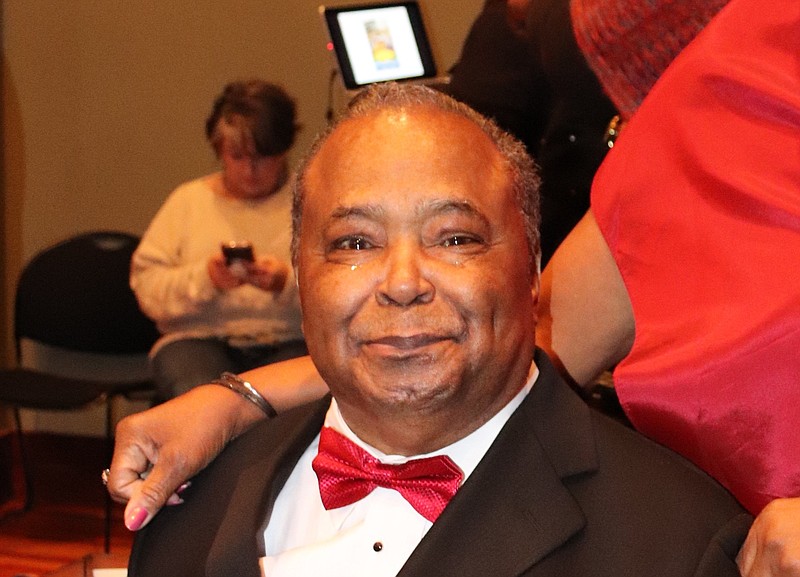Robert "Say" McIntosh, a political and community activist who was known for his high-profile attacks on Bill Clinton and his activism for Little Rock's Black community, died Saturday at age 79 after a cardiac arrest.
Born in 1943 in Osceola, Miss., McIntosh moved to Little Rock as one of 11 siblings. After dropping out of high school, he entered the restaurant business and started his own restaurant, serving a sweet potato pie that eventually led to him being known as the "Sweet Potato Pie King of Little Rock."
Key Fletcher, director of the Mosaic Templars Cultural Center in Little Rock, said the cultural center's Say It Ain't Say's Sweet Potato Pie Contest -- named in honor of McIntosh -- was more than just a pie contest, but a symbol of McIntosh's philanthropic spirit and legacy.
"He has definitely been a trailblazer in Arkansas history," Fletcher said. "He's known for giving back through the community."
"I've heard tons of stories about how he's given back with his spirit of food and giving," Fletcher added. "His pies are legendary."
McIntosh was an influential member of Little Rock's Black community -- he created Little Rock's Black Santa Claus who distributed toys to children in need, leading former Arkansas Gov. David Pryor to declare Christmas Eve in 1976 as Robert "Say" McIntosh Day. He later partnered with the Mosaic Templars Cultural Center for the toy drive, Fletcher said.
Stacie "Mack" McIntosh, the daughter of one of Robert McIntosh's brothers, said she plans to take up the Black Santa Claus mantle in the absence of her uncle.
"He showed white children that a Black man can be nice to you, give you gifts, give you candy, give you money," Stacie McIntosh said. "My uncle would teach them who's number one in you life, and the right answer is God. And so my uncle would teach everyone about God and to love each other and everything, when I was little and he came and played Black Santa. ... People really just don't know how amazing he is."
While an active member of his community, it wasn't always his charitable actions that gained widespread attention. According to the Encyclopedia of Arkansas, Robert McIntosh supposedly earned his nickname "Say" because he never failed to make his opinions known on the issues that affected his community.
Kenneth "Muskie" Harris, the Republican nominee for lieutenant governor in 1990, said that no one was safe from being confronted by Robert McIntosh, including himself during his campaign.
"He touched a nerve," Harris said. "I don't care how much power you had, if you needed confronting, he's gonna confront you about it."
In 1981, Robert McIntosh affixed himself to a cross in front of the Arkansas Capitol during an anti-racism protest against state legislators and now-former Gov. Frank White. The act nearly cost McIntosh his life, Harris said. In another instance of protest, Robert McIntosh cut down a tree planted in honor of Martin Luther King Jr. to protest the Black community's exclusion from Little Rock's political processes.
In 1990, he assaulted Ralph Forbes, another Republican candidate for lieutenant governor and a white supremacist, on live TV before later announcing he would support Forbes in the election. He was also known for his distaste for former Gov. Bill Clinton, and took particular issue with the infidelity accusations lodged against Clinton. He distributed flyers around Little Rock decrying Clinton, and at one point claimed that Clinton had had an illegitimate child.
An outspoken activist with the goal of ending the gang-related violence that plagued Little Rock in the 1990s, Robert McIntosh began placing crosses to represent the death toll during the violent period in the city's history.
"He was a really true activist, with a backbone," Harris said. "You know how some activists just stick their hand or nose in certain things? He didn't stay in the lane. He did not stay in the lane. He was activist and he was touching all bases. I guarantee that's probably what he's gonna be known for, is that no was safe from being confronted for your behavior."
Harris said that Robert McIntosh never limited himself to Pulaski County. He would go to bat for people in other communities as well, Harris said, adding that rather than hurting the community, his acts of protest helped in a variety of areas.
"He made a lot of political offices be more transparent instead of doing things behind the door and making the decisions without proper procedure," Harris said.
According to Harris, what finally caused McIntosh to lose respect within the community was when he attacked a CNN reporter outside Little Rock's federal courthouse while trying to interrupt a live report on the verdicts in the Whitewater trial in 1996. McIntosh spent 73 days in the Pulaski County jail in 1998 after receiving an eight-month sentence for the assault.
Stacie McIntosh said her uncle had been sick for a long time before his passing, noting that he had been struggling with severe diabetes. He had been released from the hospital after a multi-day stay in the days before he passed, she said.
Her uncle was "no angel," Stacie McIntosh said, but he had a deep desire to make a difference for the Black community.
"He wanted people to know the truth about him and his legacy and what he did," Stacie McIntosh said. "There will never be another like him. He truly cared. he truly loved people, humanity. And he really wanted ... to empower the Black community. He wanted to empower people of color, period."
Gallery: Robert 'Say' McIntosh, 1943-2022
